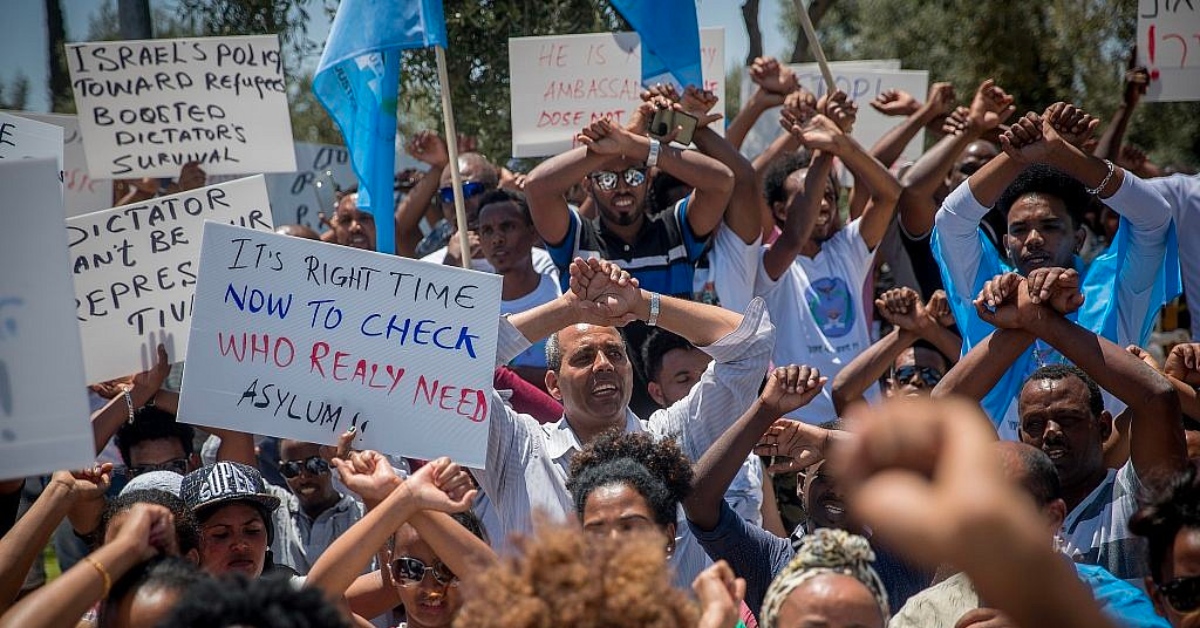In recent events, the treatment of Eritrean asylum seekers in Israel has come under intense scrutiny. It sheds light on systemic racism and human rights violations within the country.
Contents
Israel is a nation built upon the principles of providing refuge to Jewish communities worldwide. It is facing criticism for handling the Eritrean community within its borders.
This article examines the latest developments in this ongoing issue and their profound human rights implications.
The Eritrean Asylum Seeker Community in Israel
The Eritrean community in Israel is estimated to comprise around 18,000 asylum seekers.
Most fled Eritrea approximately 15 years ago, seeking refuge from the repressive policies of Eritrean President Isaias Afwerki, who has maintained a strong grip on power since Eritrea gained independence from Ethiopia in 1993.
These individuals believed that Israel, as a democratic nation, would respect their concerns and provide a haven. However, recent events have exposed a different reality.
Latest Developments
The controversy began when news of a celebratory festival in Tel Aviv to mark Eritrea’s 30th anniversary reached the Eritrean asylum seeker community.
Several countries, including Canada, the Netherlands, and the United Kingdom, cancelled similar celebrations organized by Eritrean embassies in their capitals. Israel’s police cited freedom of expression and allowed the event to proceed.
Protests and clashes erupted outside the festival venue when Eritrean asylum seekers and supporters of President Afwerki’s regime gathered.

Unfortunately, the police were ill-prepared, leading to clashes between the two Eritrean groups and confrontations with the police. Over 100 people were reported injured, some of them seriously, as the police fired live bullets.
Prime Minister Benjamin Netanyahu’s Response
Following the clashes, Prime Minister Benjamin Netanyahu convened a special ministerial team to address the situation.
He characterized the Eritrean asylum seekers as criminals. Further, he stated that their presence threatened Israel’s identity as a Jewish and democratic state.
Netanyahu also credited a border fence with Egypt for preventing “hundreds of thousands, if not millions” of Africans from entering Israel. Still, he acknowledged the challenge of those who had arrived before the fence’s completion.
Netanyahu’s response included rallying his political base against the Supreme Court and others who had protested his government’s judicial reforms.
He referred to the Eritrean community as a “problem” that needed to be resolved. He instructed the ministerial forum to develop a plan for repatriating all remaining Eritrean asylum seekers to Israel.
The Plight of Eritrean Asylum Seekers
Eritrea has been described as Africa’s North Korea due to its standardized forced labour policies. Men and unmarried women are often conscripted into indefinite military or civil service with minimal pay and no choice in their assignments.
Discharge from national service is arbitrary, and conscripts are frequently subjected to inhumane treatment, including torture. Eritreans have sought asylum in other countries to escape these conditions, and Western nations have recognized their plight.
However, Israel’s asylum system has been criticized for failing to examine applications under international standards, including the UN Refugee Convention.
Global Apartheid
The situation in Israel reflects a global issue. The government’s strategy of administrative detention aims to pressure Eritrean asylum seekers into leaving voluntarily, potentially preventing them from securing asylum elsewhere.

This approach underscores the broader issue of global apartheid and systemic racism, where the rights of asylum seekers, particularly those from Africa, are often disregarded.
UN Condemns Mass Deportations and Calls for Accountability
In the wake of the clashes involving Eritrean asylum seekers in Israel, the United Nations (UN) has expressed deep concern and urged Israel to refrain from mass deportations of Eritreans. The clashes occurred during a demonstration against an Eritrean government event in Tel Aviv and left over 200 people injured.
William Spindler, the UN Refugee Agency (UNHCR) spokesperson, stressed the importance of establishing accountability for the events.
While condemning the clashes, he also cautioned Israel against taking broad measures against Eritreans residing in the country.
Spindler’s comments responded to Israeli Prime Minister Benjamin Netanyahu’s statement that the country was considering deporting 1,000 Eritreans involved in the clashes.
Dire Human Consequences
Spindler pointed out that the situation in Eritrea, which is known as one of the world’s most authoritarian states, remains unchanged.
Sending individuals back to such a country could have dramatic human consequences. He stressed that most asylum-seekers in Israel from Eritrea are peaceful and law-abiding and that the incidents on September 2 do not reflect the behaviour of the broader Eritrean community in Israel.
As of June, there were approximately 17,850 Eritrean asylum seekers in Israel. The UNHCR reported that more than 170 asylum-seekers and dozens of police officers were injured in the clashes. The UN’s rights office also criticized the use of force by law enforcement and expressed concern about using live ammunition during the clashes of systemic racism.
The UN called for thorough investigations into the events and urged authorities to avoid hate speech.
Furthermore, the principle of non-refoulement was emphasized as a fundamental human rights principle that must be fully respected. It prohibits the return of individuals to a place where they could face harm,
The UN has voiced deep concern over the clashes involving Eritrean asylum seekers in Israel. It urged the country to adhere to international law by refraining from mass deportations and ensuring accountability for the events.
The UN has also called for the protection of the rights and safety of asylum seekers and the avoidance of hate speech.
Conclusion
The treatment of Eritrean asylum seekers in Israel has raised significant concerns about systemic racism and human rights violations.
Prime Minister Benjamin Netanyahu’s response to the clashes and his labelling of Eritreans as a “problem” demonstrate the complexities of this issue.
As the international community grapples with the plight of asylum seekers worldwide, it is essential to address systemic racism and uphold human rights principles for all individuals seeking refuge, regardless of their origin.
